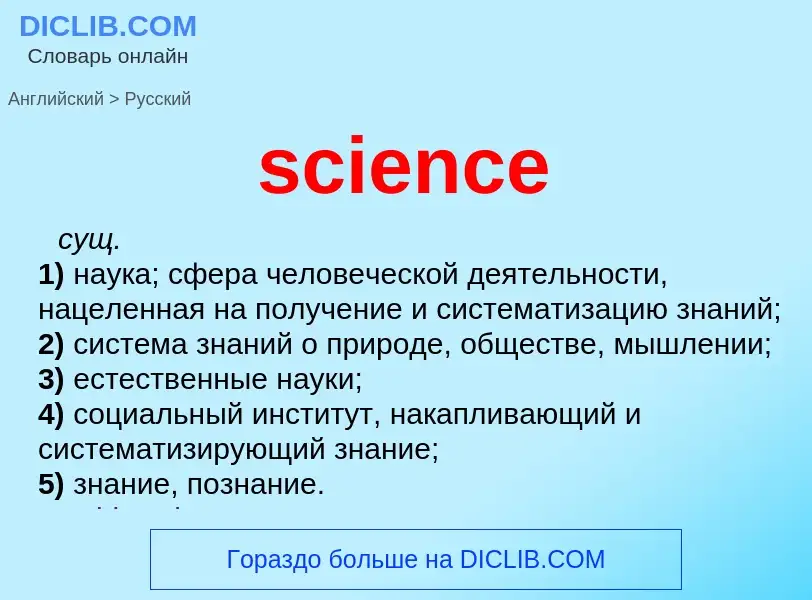Translation and analysis of words by ChatGPT artificial intelligence
On this page you can get a detailed analysis of a word or phrase, produced by the best artificial intelligence technology to date:
- how the word is used
- frequency of use
- it is used more often in oral or written speech
- word translation options
- usage examples (several phrases with translation)
- etymology
science - translation to English
[saiən'tifik]
общая лексика
научный
искусный
умелый
Смотрите также
прилагательное
общая лексика
научный
спорт
высокого класса
техничный
хорошо натренированный
ловкий
['saiəns]
общая лексика
наука
строительное дело
наука, учение
нефтегазовая промышленность
теория
существительное
общая лексика
наука
(Science) = Christian Science
умение, ловкость
собирательное выражение
естественные науки
спорт
тренированность
высокий класс
мастерство
техничность
устаревшее выражение
знание
познание
Смотрите также
Definition
Wikipedia

Science is a systematic endeavor that builds and organizes knowledge in the form of testable explanations and predictions about the universe.
The earliest written records of identifiable predecessors to modern science come from Ancient Egypt and Mesopotamia from around 3000 to 1200 BCE. Their contributions to mathematics, astronomy, and medicine entered and shaped the Greek natural philosophy of classical antiquity, whereby formal attempts were made to provide explanations of events in the physical world based on natural causes.: 12 After the fall of the Western Roman Empire, knowledge of Greek conceptions of the world deteriorated in Western Europe during the early centuries (400 to 1000 CE) of the Middle Ages, but was preserved in the Muslim world during the Islamic Golden Age and later by the efforts of Byzantine Greek scholars who brought Greek manuscripts from the dying Byzantine Empire to Western Europe in the Renaissance.
The recovery and assimilation of Greek works and Islamic inquiries into Western Europe from the 10th to 13th century revived "natural philosophy", which was later transformed by the Scientific Revolution that began in the 16th century as new ideas and discoveries departed from previous Greek conceptions and traditions. The scientific method soon played a greater role in knowledge creation and it was not until the 19th century that many of the institutional and professional features of science began to take shape, along with the changing of "natural philosophy" to "natural science".
Modern science is typically divided into three major branches: natural sciences (e.g., biology, chemistry, and physics), which study the physical world; the social sciences (e.g., economics, psychology, and sociology), which study individuals and societies; and the formal sciences (e.g., logic, mathematics, and theoretical computer science), which study formal systems, governed by axioms and rules. There is disagreement whether the formal sciences are science disciplines, because they do not rely on empirical evidence. Applied sciences are disciplines that use scientific knowledge for practical purposes, such as in engineering and medicine.
New knowledge in science is advanced by research from scientists who are motivated by curiosity about the world and a desire to solve problems. Contemporary scientific research is highly collaborative and is usually done by teams in academic and research institutions, government agencies, and companies. The practical impact of their work has led to the emergence of science policies that seek to influence the scientific enterprise by prioritizing the ethical and moral development of commercial products, armaments, health care, public infrastructure, and environmental protection.





.jpg?width=200)




